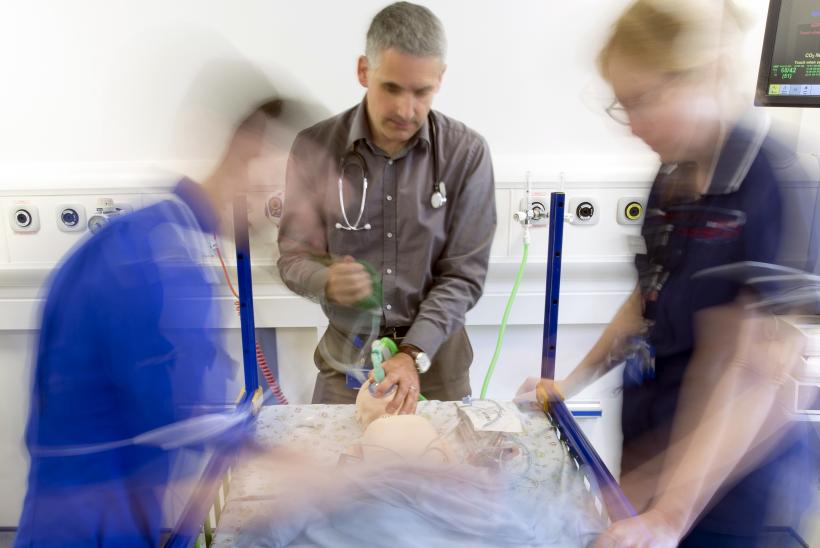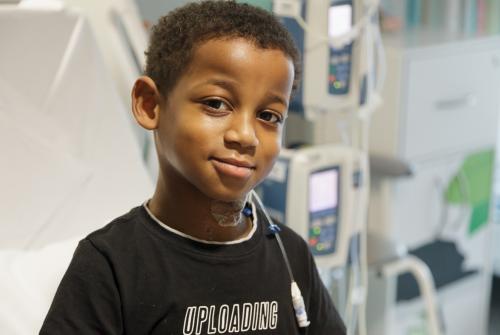GOSH learning academy

Educating workforce for the future
At GOSH we strive to create a learning culture for all staff, ensuring they receive continual support, education, and training to enhance their specialist skills and provide the best care for our exceptional patients. A wealth of training programmes are on offer including simulation, clinical skills, speciality training and leadership development, plus undergraduate and postgraduate academic education courses.
For more details on the Learning Academy please visit their home page.
Find out more about the range of education available through the GOSH Learning Academy for clinical and non-clinical professionals:
Post Graduate Medical Education (PGME)
PGME designs and supports the delivery of up-to-date, relevant, work-related training for doctors throughout Great Ormond Street NHS Foundation Trust. Our programme content is designed to put patient safety and quality of care at the heart of our teaching.
We provide a supportive culture of learning and professional development where participants are given the opportunity to reflect and demonstrate the expectations of good medical and working practice.
We also provide a range of inter-professional programmes that are intended to support the professional development needs of all medical, non-medical and administrative staff.
Many of our courses and events are open to external staff.
On the last Friday of every month, we invite a guest speaker to present on a topic of interest, focusing on innovative medical challenges and change and the latest research and treatments in specialist areas.
Time: 13:00 – 14:00
Venue: Lecture Theatre, Weston House
Great Ormond Street Hospital (GOSH) is a specialist children's hospital providing state-of-the-art management and research in paediatric conditions.
With an emphasis on serious and rare disorders, the hospital is a great choice for students looking for a specialist paediatric experience in medicine, anaesthesia, radiology and surgery. As we do not have a casualty department, GOSH may not be an appropriate choice if you wish to learn about general paediatrics. Some departments follow patients into adulthood, but the majority see children aged up to 18.
Role and responsibilities
Our medical student supervisors work with each student to tailor the visit to their requirements. The main aim of most student attachments is to learn about clinical paediatrics, but opportunities may arise to perform audits and get involved in research.
Throughout your time at GOSH you will be supervised by a responsible clinician or consultant to make sure you do not engage in any activity beyond your level of competence.
Examples of skills and tasks that medical students perform:
- Take a history from children and their parents
- Examine children
- Access written and computerised patient records
- Observe procedures
- Attend investigations
- Present patients on the ward round and/or clinical meetings and discuss patient details with other members of the team
- Review additional patient information for audit, research or other official projects.
You must, therefore:
- Respect patient consent and confidentiality at all times. In particular, you should be careful not to have clinical-related discussions outside designated medical areas.
- Be aware of, and adhere to, GOSH policies, particularly regarding child protection and child safety within the hospital and their specialty areas. You should make your supervisor aware of any issues as a matter of urgency.
- Inform the team immediately of new health or probity issues that may affect your dealings with children, parents or other team members.
Application process - Query
In order to apply for an elective, please complete the application form and submit along with a copy of your CV and two written references. Your references must be on headed paper and from university tutors or clinical consultants who know you well. Please submit your completed application form and attachments to Student&Observerplacements@gosh.nhs.uk. The subject of your email should be “Your Name – Medical Student Elective – Month/Year of elective”. Incomplete applications will not be considered.
Upon receipt of your completed application, we will endeavour to secure a placement for you in your nominated specialty.
If a placement is agreed you will be notified of the required next steps in order to secure your placement. This will include a number of pre-placement clearances and mandatory training -occupational health, Disclosure and Barring Service (formerly Criminal Records Bureau disclosure), identity documents and Safeguarding Children training (e-learning).
Learn more about being an undergraduate at GOSH here.
We have over 400 Consultants who contribute to patient care at GOSH. Find out more about the support available and opportunities for continued professional development.:
Named Clinical and Educational Supervision
All Named Clinical Supervisors and Named Educational Supervisors working in London must be fully compliant with all 7 areas of the Professional Development Framework in continue to perform their roles as trainers
The Professional Development Framework sets out mandatory developmental areas which both current and prospective named educational and named clinical supervisors in secondary care medicine and dentistry must be able to demonstrate training in.
Accreditation is part of the Professional Development Framework and is a GMC initiative which aims to help educational organisations demonstrate that all named supervisors, both Clinical and Educational are appropriately trained.
New supervisors need to complete the full accreditation process, which includes:
- Training that covers the 7 domains of the Professional Development Framework - This can be achieved by attending face-to-face training or eLearning
- Equality and diversity training
- Completion of the Professional Development Portfolio - Signed off by the Deputy Medical Director for Medical Education
Existing supervisors need to complete the re-accreditation process every three years, which includes:
- Equality and diversity training
- Updated Professional Development Portfolio - Signed off by the Deputy Medical Director for Medical Education
Postgraduate Training Committee (PGTC)
The PGTC meets quarterly to discuss issues of educational importance within the trust and is chaired by the Deputy Director of Medical Education, Dr Sanjiv Sharma.
The PGTC reports to the Education and Workforce Board. This committee is attended by divisional and departmental Educational Leads, Trainee Representatives and key educational stakeholders.
Study leave - Consultants
Study leave is available to all Consultants at Great Ormond Street Hospital.
All study leave applications must be returned to the PGME team at least six weeks prior to the request stated on the form, but under certain circumstances exceptions can be made.
Study leave allowance for consultants runs with the financial year, April-March and can be used for courses or conferences.
The Trust’s Consultant study leave budget allows up to £50.00 per GOSH PA per financial year for study leave, up to a maximum of £500.00; this applies to Consultants who work at least two PAs at GOSH.
Entitlement to study leave will be based on the basic 10 PA contract. Staff working more than 10 PAs per week do not accrue additional pro-rata study leave/professional leave entitlement.
Study Leave is discretionary and it needs to be approved by your Head of Clinical Service. The PGME Services team do not deal with professional or sabbatical leave this is handled within Medical HR.
Medical HR & PGME Services:
Address: Level 4, Russell Square House, 10-12 Russell Square, Bloomsbury, London, WC1B 5EE
Phone: 0207 405 9200 ext. 0066
Email: PGM.OP@gosh.nhs.uk
Hours: 9:00am to 5:00pm
We have over 300 junior doctors working at GOSH. Make the most of your time here by exploring our training and development resources.
Find out more about:
- Appraisals
-
Junior Doctors Forum
-
Junior Doctor Induction
-
Revalidation - Junior doctors
-
Study leave
through the Student Doctor portal.
Medical HR & PGME Services:
Address: Level 4, Russell Square House, 10-12 Russell Square, Bloomsbury, London, WC1B 5EE
Phone: 0207 405 9200 ext. 0066
Email: PGM.OP@gosh.nhs.uk
Hours: 9:00am to 5:00pm
Workforce Development plan, design and develop programmes which will enable the organisation to meet its strategic goals. This includes the introduction of flexible development programmes tailored to individuals’ career paths and instilling new collaborative ways of working and key digital skills.
User Journey Mapping
We map out all the touch points in user journeys, be that patients or staff, and design training and development programmes accordingly. We offer a flexible suite of options enabling both long term personal development and an enhanced patient experience.
Online learning
Learning is provided at GOSH through a variety of forms including traditional classroom-based learning, simulation training, social learning and networking via our successful online campus - GOLD (GOSH Online Learning and Development). GOLD provides a blended approach to learning and development via formal and informal learning enabling staff to share skills, knowledge and collaborate with colleagues across the Trust.
Coaching & Mentoring
To develop coaching and mentoring skills the Trust is working on introducing a number of coaching and mentoring programmes. As a member and partnering organisation, Great Ormond Street Hospital abide by EMCC Competence Framework and Code of Ethics.
Weston House Training Facilities
Weston House is the physical centre of our learning delivery. Whether you are attending a training day, delivering an educational programme, or an external organisation using the facilities, we have the rooms to meet your needs. Find out more about our Weston House training facilities.
The UCL Great Ormond Street Institute of Child Health (ICH) and Great Ormond Street Hospital (GOSH) form the largest paediatric research and teaching centre in Britain.
Together, we carry out research into the causes and treatments of childhood illnesses and offer training courses and programmes for postgraduate medical and other professional staff with interests in child health and welfare.
We offer a comprehensive programme of continuing professional development courses for hospital and community-based paediatricians, and those working in related disciplines, including physiotherapists, speech and language therapists, occupational therapists, dieticians, psychologists and nurse specialists.
Many of the courses and conferences are multidisciplinary in approach, providing an ideal forum for discussion and exchange of information in the treatment and management of a diverse range of conditions.
Attending our events will ensure that you keep up-to-date and informed about the latest developments in paediatric medicine.
View the list of our courses and conferences
(Please note you will be re-directed to the new ICH Events website)
Contact us:
ICH Events
UCL Great Ormond Street Institute of Child Health
30 Guilford Street
London
WC1N 1EH
Email: ich.events@ucl.ac.uk
Telephone: +44 (0)20 7905 2699 or +44 (0)20 7905 2675
Clinical Simulation Centre
By accurately simulating the clinical environment, we allow teams and individuals to practise, in safety, the technical and non-technical skills required to provide care to sick children within Great Ormond Street Hospital (GOSH) and beyond.
The Clinical Simulation Centre has replicated clinical rooms to provide immersive environments which simulate clinical scenarios for staff training.
Staff are debriefed on their performance afterwards in the Audiovisual Debriefing and Lecture room. The centre can be hired out for filming and other training events.
All the rooms are air conditioned and noise isolated.
Please contact simulation@gosh.nhs.uk for details.
Intensive Care and Theatre Room
Equipment levels are adjusted according to setting and the nature of the critical illness scenario. Explore the Intensive Care and Theatre Room in 360°.
Ward Cubicle or Parents' Room
Equipment levels are adjusted according to setting and the nature of the scenario.
Scenario and Manikin Control Room
The room has two, one-way glass windows and camera control consoles to record training sessions for the debrief.
Audiovisual Debriefing and Lecture Room
The room can be set out in boardroom, lecture or circular formats. Catering and beverage options are available.


